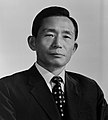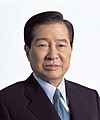Portal:South Korea
 |
환영합니다! / Welcome To The South Korea Portal!  South Korea, officially the Republic of Korea (ROK), is a country in East Asia. It constitutes the southern part of the Korean Peninsula and borders North Korea along the Korean Demilitarized Zone; though it also claims the land border with China and Russia. The country's western border is formed by the Yellow Sea, while its eastern border is defined by the Sea of Japan. South Korea claims to be the sole legitimate government of the entire peninsula and adjacent islands. It has a population of 51.96 million, of which roughly half live in the Seoul Capital Area, the ninth most populous metropolitan area in the world. Other major cities include Incheon, Busan, and Daegu. The Korean Peninsula was inhabited as early as the Lower Paleolithic period. Its first kingdom was noted in Chinese records in the early 7th century BCE. Following the unification of the Three Kingdoms of Korea into Silla and Balhae in the late 7th century, Korea was ruled by the Goryeo dynasty (918–1392) and the Joseon dynasty (1392–1897). The succeeding Korean Empire (1897–1910) was annexed in 1910 into the Empire of Japan. Japanese rule ended following Japan's surrender in World War II, after which Korea was divided into two zones: a northern zone occupied by the Soviet Union, and a southern zone occupied by the United States. After negotiations on reunification failed, the southern zone became the Republic of Korea in August 1948, while the northern zone became the communist Democratic People's Republic of Korea the following month. In 1950, a North Korean invasion began the Korean War, which ended in 1953 after extensive fighting involving the American-led United Nations Command and the People's Volunteer Army from China with Soviet assistance. The war left 3 million Koreans dead and the economy in ruins. The authoritarian First Republic of Korea led by Syngman Rhee was overthrown in the April Revolution of 1960. However, the Second Republic was incompetent as it could not control the revolutionary fervor. The May 16 coup of 1961 led by Park Chung Hee put an end to the Second Republic, signaling the start of the Third Republic in 1963. South Korea's devastated economy began to soar under Park's leadership, recording the one of fastest rises in average GDP per capita. Despite lacking natural resources, the nation rapidly developed to become one of the Four Asian Tigers based on international trade and economic globalization, integrating itself within the world economy with export-oriented industrialization. The Fourth Republic was established after the October Restoration of 1972, in which Park wielded absolute power. The Yushin Constitution declared that the president could suspend basic human rights and appoint a third of the parliament. Suppression of the opposition and human rights abuse by the government became more severe in this period. Even after Park's assassination in 1979, the authoritarian rule continued in the Fifth Republic led by Chun Doo-hwan, which violently seized power by two coups and brutally suppressing the Gwangju Uprising. The June Democratic Struggle of 1987 ended authoritarian rule, forming the current Sixth Republic. The country is now considered among the most advanced democracies in Continental and East Asia. (Full article...) Selected article - K-pop (Korean: 케이팝; RR: keipap), short for Korean popular music, is a form of popular music originating in South Korea as part of South Korean culture. It includes styles and genres from around the world, such as pop, hip hop, R&B, rock, jazz, gospel, reggae, electronic dance, folk, country, disco, and classical on top of its traditional Korean music roots. The term "K-pop" became popular in the 2000s, especially in the international context. The Korean term for domestic pop music is gayo (가요; 歌謠), which is still widely used within South Korea. While "K-pop" can refer to all popular music or pop music from South Korea, it is colloquially often used in a narrower sense for any Korean music and artists associated with the entertainment and idol industry in the country, regardless of the genre.[contradictory] The more modern form of the genre, originally termed "rap dance", emerged with the formation of the hip hop boy band Seo Taiji and Boys, in 1992. Their experimentation with different styles and genres of music and integration of foreign musical elements helped reshape and modernize South Korea's contemporary music scene. Modern K-pop "idol" culture began in the 1990s, as K-pop idol music grew into a subculture that amassed enormous fandoms of teenagers and young adults. After a slump in early idol music, from 2003, TVXQ and BoA started a new generation of K-pop idols that broke the music genre into the neighboring Japanese market and continue to popularize K-pop internationally today. With the advent of online social networking services and South Korean TV shows, the current spread of K-pop and South Korean entertainment, known as the Korean Wave, is seen not only in East Asia, but also throughout the world, gaining an international audience. (Full article...)Selected image The 2010 G-20 Seoul summit was the fifth meeting of the G-20 heads of government to discuss the global financial system and the world economy. It was held in Seoul, South Korea. More did you know -
In the news
This is a Good article, an article that meets a core set of high editorial standards.
"Gangnam Style" (Korean: 강남스타일, IPA: [kaŋ.nam sɯ.tʰa.il]) is a K-pop song by South Korean rapper Psy, released on July 15, 2012, by YG Entertainment as the lead single of his sixth studio album, Psy 6 (Six Rules), Part 1 (Ssai Yukgap Part 1). The term "Gangnam Style" is a neologism that refers to the nouveau riche lifestyles associated with the Gangnam region of Seoul. On July 15, 2012, "Gangnam Style" debuted at number one on South Korea's Gaon Chart, receiving generally positive reviews, with praise for its catchy beat and Psy's amusing dancing during live performances and in various locations around the world in its music video. The song and its music video went viral in August 2012 and have influenced popular culture worldwide. In the United States, "Gangnam Style" peaked at number two on the Billboard Hot 100, which at the time, was the highest charting song by a South Korean artist. By the end of 2012, "Gangnam Style" had topped the music charts of more than 30 countries including Australia, Canada, France, Germany, Italy, Russia, Spain, and the United Kingdom. Psy's dance in the music video itself became a cultural phenomenon. It subsequently won Best Video at the MTV Europe Music Awards held that year. It became a source of parodies and reaction videos by many different individuals, groups, and organizations. On December 21, 2012, "Gangnam Style" became the first YouTube video to reach a billion views. The song's music video was the most viewed video on YouTube from November 24, 2012, when it surpassed the music video for "Baby" by Justin Bieber featuring Ludacris, to July 10, 2017, when it was itself surpassed by the music video for "See You Again" by Wiz Khalifa featuring Charlie Puth. (Full article...)General images -The following are images from various South Korea-related articles on Wikipedia.
Did you know (auto-generated)
WikiProjectsSee WikiProject Korea for collaborating on South Korea topics, and more broadly, on all things Korea-related. South Korea topics
CategoriesAdministrative divisions of South Korea
Related portalsEast Asia Associated WikimediaThe following Wikimedia Foundation sister projects provide more on this subject:
Web resources
SourcesDiscover Wikipedia using portals |
























































